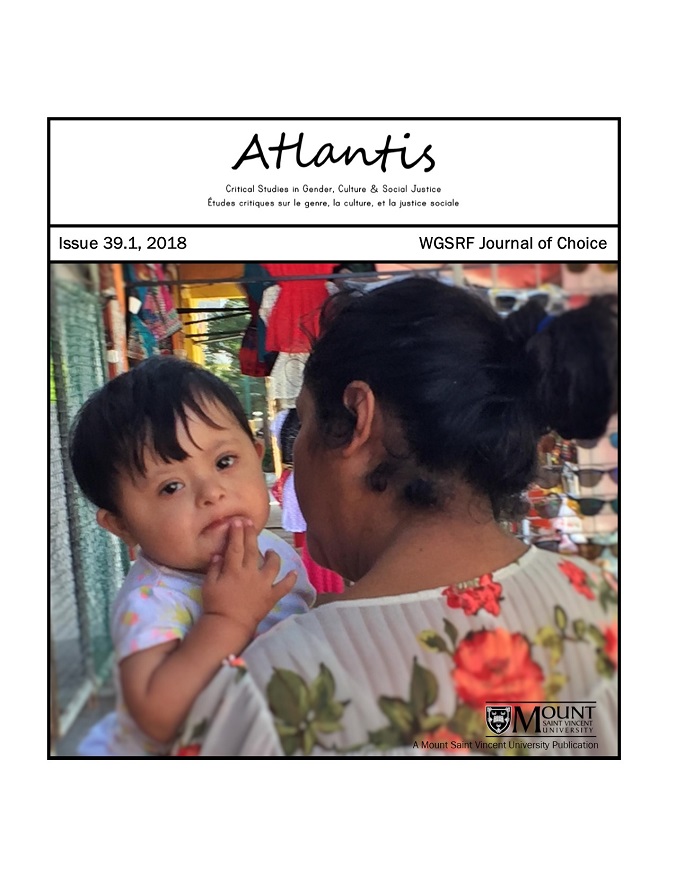The Black Woman Native Speaking Subject: Reflections of a Black Female Professor in Canada
Mots-clés :
Blacks in Canada, Caribbean diaspora, gender representationsRésumé
This paper interweaves literary and feminist theories alongside personal life stories to demonstrate the collapse of the boundaries of the personal and the intellectual in the pedagogical practices of Black female professors. The paper suggests that acknowledging the precariousness of performing one’s Blackness in university classrooms presents new possibilities for shared learning.
Résumé
Cet article entrelace des théories littéraires et féministes avec des récits de vie personnels pour démontrer l’effondrement des frontières entre la sphère privée et le domaine intellectuel dans les pratiques pédagogiques des femmes professeures noires. L’article suggère que la reconnaissance de la précarité de la manifestation de la négritude dans les classes d’université présente de nouvelles possibilités d’apprentissage partagé.
Références
Bannerji, Himani. 2000. The Dark Side of the Nation: Essays on Multiculturalism, Nationalism, and Gender. Toronto: Canadian Scholar’s Press.
Brand, Dionne. 2001. A Map to the Door of No Return: Notes to Belonging. Toronto: Vintage Canada.
____. 2000. At the Full and Change of the Moon. Toronto: Vintage Canada.
Brodber, Erna. 1990. “Fiction in the Scientific Procedure.” In Caribbean Women Writers: Essays from the First International Conference, edited by Selwyn Cudjoe, 164-168. Wellesley: Calaloux Publications.
____. 1980. Jane and Louisa Will Soon Come Home. London: New Beacon Books.
____. 1994. Louisiana. London: New Beacon Books.
____. 2004. Woodside, Pear Tree Grove P.O. Kingston: University of West Indies Press.
Clifford, James. 1997. Routes: Travel and Translation in the Late Twentieth Century. Cambridge, Massachusetts: Harvard University Press.
Combahee River Collective. 1978. “A Black Feminist Statement.” In Capitalist Patriarchy and the Case for Socialist Feminism, edited by Zilla R. Eisenstein, 210-218. New York: Monthly Review Press.
Cotterill, Pamela, and Gayle Letherby. 1993. "Weaving Stories: Personal Auto/Biographies in Feminist Research." Sociology 27 (1): 67-79.
Danticat, Edwidge. 1994. Breath, Eyes, Memory: A Novel. New York: Vintage Books.
Davies, Ioan. 2000. “Theorizing Toronto.” Topia: Canadian Journal of Cultural Studies 3 (Spring): 14-36.
Fine, Michelle. 1992. Disruptive Voices: The Possibilities of Feminist Research. Ann Arbor, Michigan: University of Michigan Press.
Freire, Paulo. 2000. Pedagogy of the Oppressed. New York: Continuum.
Hanisch, Carol. 2000. “The Personal is Political.” In Radical Feminism: A Documentary Reader, edited by Barbara A. Crow, 113-116. New York: New York University Press.
hooks, bell. 1994. Teaching to Transgress: Education as the Practice of Freedom. New York: Routledge.
Lorde, Audre. 1984. Sister Outsider. California: Crossing Press.
MacKinnon, Catherine A. 1982. “Feminism, Marxism, Method and the State: An Agenda for Theory.” Signs 7 (3): 515-544
Magda, Lewis. 2005. “More Than Meets the Eye: The Under Side of the Corporate Culture of Higher Education and Possibilities for a New Feminist Critique.” Journal of Curriculum Theorizing 21(1).
Marable, Manning. 1995. Beyond Black and White: Transforming African-American Politics. London: Verso.
Philip, NourbeSe M. 1990. “Managing the Unmanageable.” In Caribbean Women Writers: Essays from the First International Conference, edited by Selwyn Cudjoe, 295-300. Wellesley: Calaloux Publications.
Smith, Malinda S. with Kimberly Gamarro and Mansharn Toor. 2017. “A Dirty Dozen: Unconscious Race and Gender Biases in the Academy.” In The Equity Myth: Racialization and Indigeneity at Canadian Universities, by Frances Henry, Enakshi Dua, Carl E. James, Audrey Kobayashi, Peter Li, Howard Ramos, and Malinda S. Smith, 263-296. Vancouver and Toronto: UBC Press.
Swan, Elaine. 2008. “Let’s Not Get Too Personal: Critical Reflection, Reflexivity, and the Confessional Turn.” Journal of European Industrial Training 32 (5): 385-399.
Téléchargements
Publié
Numéro
Rubrique
Licence
© Atlantis: Études critiques sur le genre, la culture, et la justice 2018

Cette œuvre est sous licence Creative Commons Attribution 4.0 International.
Les auteurs qui publient dans cette revue acceptent les conditions suivantes:
1. Les auteurs conservent les droits d’auteur et accordent le droit de première publication à la revue. L’œuvre est simultanément sous licence internationale Creative Commons Attribution 4.0 qui permet à d’autres personnes de la partager en citant dans les remerciements l’auteur de l’œuvre et sa publication initiale dans cette revue.
2. Les auteurs savent que les articles publiés dans Atlantis sont indexés et disponibles par le biais de divers outils de recherche universitaires et professionnels, y compris, entre autres, Erudit.
3. Les auteurs peuvent conclure des ententes contractuelles supplémentaires et distinctes pour la distribution non exclusive de la version de l’article publiée par la revue (c’est-à-dire, l’afficher dans un dépôt institutionnel ou la publier dans un livre), en signalant qu’elle a été initialement publiée dans cette revue.
4. Les auteurs sont autorisés et encouragés à prépublier leur œuvre, c’est-à-dire à la publier en ligne (dans un dépôt institutionnel ou sur leur site Web, par exemple) avant et pendant le processus de soumission. Cela peut conduire à des échanges productifs, ainsi qu’à ce que le travail publié soit cité plus tôt et plus souvent. Renseignez-vous davantage ici sur la prépublication.







